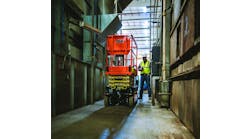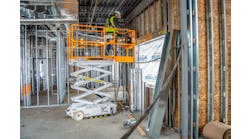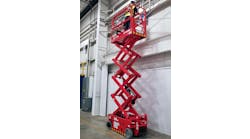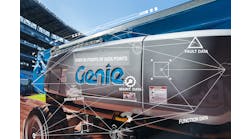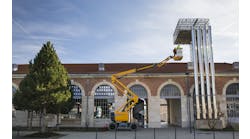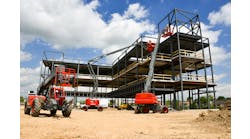Larry Silber has worked in many product areas and many management capacities. He has mentored and trained important industry leaders. In this candid interview, Silber talks about his work at Ingersoll Rand, and most recently, Doosan Infracore Portable Power, about the challenges the industry faces, why he sees that more consolidation is inevitable and how long he thinks the current downturn will last. On a personal level, he talks about overcoming cancer in his lifetime, and about why he wants to retire while he’s batting .400. Like many, we hope we haven’t heard the last of Larry Silber.
RER: Why retire? You’re fairly young still.
Silber: I’m retiring on a high note after 29 1/2 years with Ingersoll Rand and its successor Doosan Infracore for the last six months. Now just seems like the right timing. June 1 is my 30th anniversary of employment with what would have been Ingersoll Rand.
I think we've done everything that I set out to do with the business over the past few years. We refocused the business strategically, we gave it a new name, Portable Power, previously known as Utility Equipment. We opened our new world headquarters in Statesville, N.C. We’ve repositioned the other factories around the world out of Ingersoll Rand plants and into standalone facilities. And we built an outstanding management and leadership team, and product development is chock full of products. We introduced some products at ConExpo and a number of others are on the path to be introduced over the next six to 12 months.
I feel like I’m batting .400 and I’d like to go out being remembered that way. I’d rather leave a business on my own terms and with nothing but great memories about the business, about the industry, and the people that I’ve worked with.
At this point in my career I want to take some time to enjoy the fruits of my labor.
You aren’t that old, you’re an energetic guy, after a year or two you might be itching for a new challenge.
It is possible. We bought a house at the Jersey shore about the time I took on my current role. We haven’t had a chance to be there as much as we had hoped because I’ve been on the road so much. So I certainly want to get some use out of that this summer with my family. My priorities for the future are to remain in New Jersey, set my own schedule, and enjoy life.
Are there certain highlights of your career, certain accomplishments you’re most proud of?
Throughout 30 years, there are lots of things I can draw attention to. First of all being hired by Ingersoll Rand and then progressing through the ranks. A number of my promotions to different positions were highlights, and certainly a lot of the product development I was involved in throughout my career. We did some groundbreaking product development, whether it was using new technology, new materials or speed to market from concept to introduction. It happened in the tool business, in the hoist and winch business, in the construction equipment business, and, in particular, in this last role in the portable power business.
Certainly starting a few businesses was fun along with growing them. Creating Ingersoll Rand’s remarketing business and developing the capability around that, and then growing remarketing within three years into a business with revenues in excess of $100 million. It was a lot of fun. I was given a lot of latitude to get it off the ground and that’s certainly a highlight.
Developing and growing our company-owned store network, both within the United States and outside, to where it really became a key part of our distribution strategy was very important. And then relationships and development of our position in the rental industry, where the company allowed me to take an active role in leadership positions, participating on boards, and getting involved heavily in the rental industry. Those are several things that stick out in my mind.
And then, finally, the development of talent. Over the years, I’ve had some tremendous people work with me and for me whom I’ve helped develop and promote. Many of them today are CEOs, presidents, chief operating officers and others holding senior leadership positions of companies inside and outside of the industry. I feel very special about helping people develop and grow.
I’d say the biggest challenge of my life was battling cancer 10 years ago. This past February was my 10th anniversary of successfully beating a pretty horrible disease. In November 1997, I was diagnosed with non-Hodgkins lymphoma and I spent six months of my life battling for survival. I was one of the lucky ones. That experience gave me a new perspective on life. That’s when I really focused on the aspect of people development as something that I wanted to do. I got involved in the rental industry at that point and spent considerable time developing relationships and understanding the rental industry.
It sounds like you’re leaving with a feeling of satisfaction.
It is an appropriate time for me to make an exit at the top of my game and feeling good about where I’m leaving the business.
I didn’t get here alone. I surrounded myself with people of diverse capabilities, backgrounds, and tremendous talent. As long as you have trust and respect of one another, the team will help guide you in the right direction and you can be successful. We’ve always had great camaraderie within our organization.
Who were some of the mentors that have influenced you in your business career?
My father was probably my greatest mentor. He was a tremendous influence on how I live my life, how I've led my career, and how I conducted business. I always operated with the highest integrity and honesty.
The Ingersoll Rand culture was always one of mentorship, of developing and training talent and preparing individuals to lead the business in future years. I learned this from day one. My first boss said, “Your job is to train your successor,” and that was the culture. Another of my early mentors said, “You always want to surround yourself with people who are better than you, and you will insure success.” There were many great mentors at Ingersoll Rand.
It’s been fun, it’s been rewarding, it’s been exciting and certainly something I will miss, but I hope to stay in touch with many of those people as my life moves on.
Looking at the construction industry and the rental industry, what are some of the major challenges you see ahead?
Certainly the economic climate and crisis we’re in today will have an effect on the manufacturing side as well as on the rental side of the business. We’ll probably see further consolidation in both manufacturing and rental. Manufacturers will be forced to consolidate to get economies of scale. There’s a glut of manufacturers, many in categories we participate in with literally dozens of competitors, and that’s probably too many for the climate we are in.
I think rental companies will have to contract during this economic downturn, make sure they right-size their fleet, and make sure they’re spending the appropriate capital to keep the fleet fresh. I think there are some marginal players in the middle and we’ll see a few of them continue to consolidate over the next 12 to 18 months. They’ll get bought up by and rolled into some of the bigger rental giants, and I think we’ll see one or two marginal players fall by the wayside.
I think there will be a couple of very significant senior leadership changes in the near future. I also think there will be a sorting out of those companies that play in rental and those that choose not to. There are some companies that have chosen to do rental direct as a manufacturer. I don’t think long-term rental direct as a manufacturer survives. Rental needs to be a private business. I don’t think manufacturers can do that because there’s too much conflict with their primary distribution channel.
Do you have a crystal ball about how long the economic downturn will last?
Generally cycles run three years, and in my career, I haven’t seen a cycle last more than three years. I think we’re probably nine to 12 months into this one now. We have a little further to go and a little lower to go. Maybe by the fourth quarter of this year or the first quarter of ’09 we'll start to see a slow comeback.
At Doosan Infracore Portable Power, we’re doing well. Our business is very solid and strong. Doosan has been very supportive and has invested heavily in allowing us to position this business, and build a new world headquarters and future.


